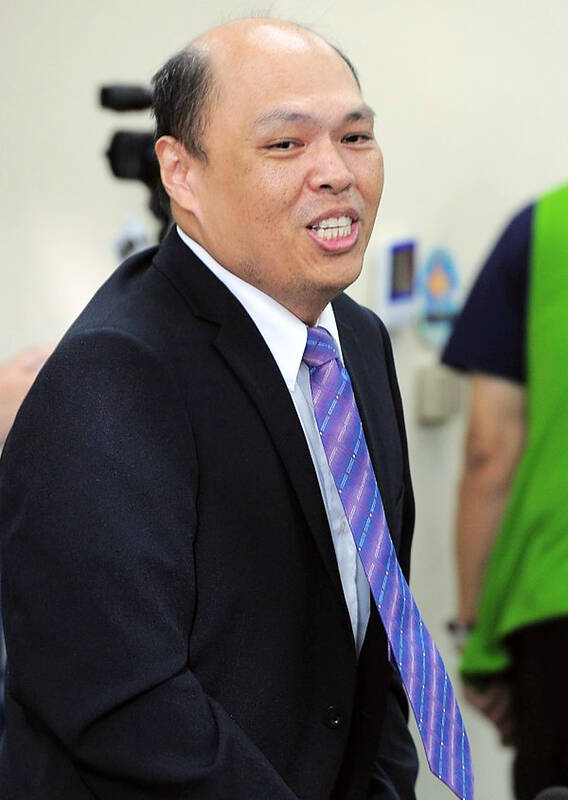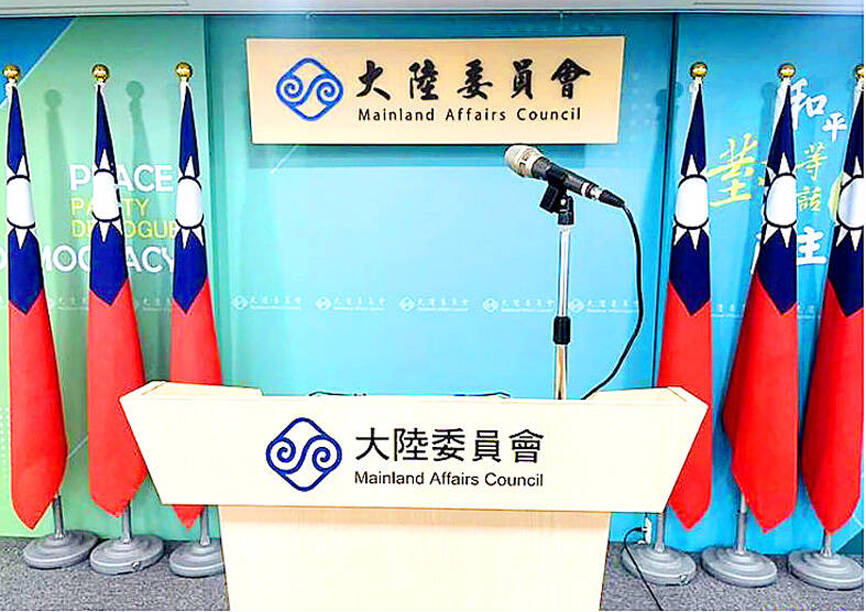A former Chinese Nationalist Party (KMT) mainland affairs director is to be investigated by the Mainland Affairs Council for allegedly claiming to represent Taiwanese when attending a symposium in China earlier this month that observed the 20th anniversary of the implementation of China’s “Anti-Secession” Law at which he said that the law is “the best medicine for unification,” an official familiar with the matter said yesterday.
The council would investigate if Huang Ching-hsien (黃清賢) contravened the Act Governing Relations Between the People of the Taiwan Area and the Mainland Area (臺灣地區與大陸地區人民關係條例) by colluding with high-ranking members of the Chinese Communist Party (CCP), as well as Chinese military and government officials.
The highest-ranking Chinese official at the symposium held in the Great Hall of the People in Beijing on March 14 was National People’s Congress of China Chairman Zhao Leji (趙樂際). Chinese Minister of Foreign Affairs Wang Yi (王毅), United Front Work Department head Shi Taifeng (石泰峰), Minister of Public Security Wang Xiaohong (王小洪), Chief of Staff of the Joint Staff Department of the Central Military Commission Liu Zhenli (劉振立), Commander of the Eastern Theater Command of the People’s Liberation Army Lin Xiangyang (林向陽) and other officials also attended.

Photo: Taipei Times
Huang, who serves as director of the Taiwan Political Research Center at Nankai University in Tianjin, China, said that Taiwan’s “unification with the motherland” would be best achieved through peaceful means, which is in line with the fundamental rights and interests of compatriots on both sides of the Taiwan Strait.
The “Anti-Secession” Law combats “Taiwanese independence separatists” and would curb their impulses for independence, he said, adding that it authorizes the Chinese government to use non-peaceful means and other measures to prevent secession.
The authorities in Taiwan should consider the rights and welfare of the public and not misjudge the situation, he added.

Photo: Taipei Times
Huang claimed to represent Taiwan at the event that was designed to intimidate Taiwanese, and what he said was used by the CCP as propaganda, the official said.
Huang might have contravened Article 33-1 of the act, which bans people, organizations or other institutions from engaging in any form of cooperative activity with agencies, institutions or organizations in China which are attached to the CCP or the military, or which are involved in political work against Taiwan or affect national security or Taiwan’s interests, the official said.
Huang would be asked to return to Taiwan to explain himself, the official said.
The government would definitely enforce cross-strait regulations since Huang went to the event to support the CCP, the official said.
If Huang has a household registration in China, his Taiwanese ID card would be revoked and he would be asked to leave the country, the official said.

Right-wing political scientist Laura Fernandez on Sunday won Costa Rica’s presidential election by a landslide, after promising to crack down on rising violence linked to the cocaine trade. Fernandez’s nearest rival, economist Alvaro Ramos, conceded defeat as results showed the ruling party far exceeding the threshold of 40 percent needed to avoid a runoff. With 94 percent of polling stations counted, the political heir of outgoing Costa Rican President Rodrigo Chaves had captured 48.3 percent of the vote compared with Ramos’ 33.4 percent, the Supreme Electoral Tribunal said. As soon as the first results were announced, members of Fernandez’s Sovereign People’s Party

MORE RESPONSIBILITY: Draftees would be expected to fight alongside professional soldiers, likely requiring the transformation of some training brigades into combat units The armed forces are to start incorporating new conscripts into combined arms brigades this year to enhance combat readiness, the Executive Yuan’s latest policy report said. The new policy would affect Taiwanese men entering the military for their compulsory service, which was extended to one year under reforms by then-president Tsai Ing-wen (蔡英文) in 2022. The conscripts would be trained to operate machine guns, uncrewed aerial vehicles, anti-tank guided missile launchers and Stinger air defense systems, the report said, adding that the basic training would be lengthened to eight weeks. After basic training, conscripts would be sorted into infantry battalions that would take

GROWING AMBITIONS: The scale and tempo of the operations show that the Strait has become the core theater for China to expand its security interests, the report said Chinese military aircraft incursions around Taiwan have surged nearly 15-fold over the past five years, according to a report released yesterday by the Democratic Progressive Party’s (DPP) Department of China Affairs. Sorties in the Taiwan Strait were previously irregular, totaling 380 in 2020, but have since evolved into routine operations, the report showed. “This demonstrates that the Taiwan Strait has become both the starting point and testing ground for Beijing’s expansionist ambitions,” it said. Driven by military expansionism, China is systematically pursuing actions aimed at altering the regional “status quo,” the department said, adding that Taiwan represents the most critical link in China’s

EMERGING FIELDS: The Chinese president said that the two countries would explore cooperation in green technology, the digital economy and artificial intelligence Chinese President Xi Jinping (習近平) yesterday called for an “equal and orderly multipolar world” in the face of “unilateral bullying,” in an apparent jab at the US. Xi was speaking during talks in Beijing with Uruguayan President Yamandu Orsi, the first South American leader to visit China since US special forces captured then-Venezuelan president Nicolas Maduro last month — an operation that Beijing condemned as a violation of sovereignty. Orsi follows a slew of leaders to have visited China seeking to boost ties with the world’s second-largest economy to hedge against US President Donald Trump’s increasingly unpredictable administration. “The international situation is fraught